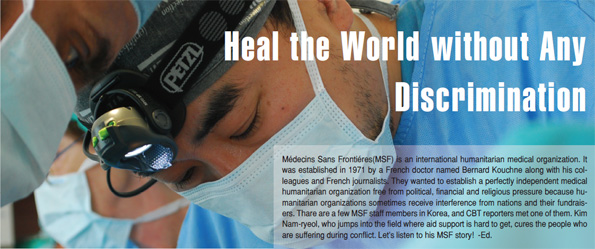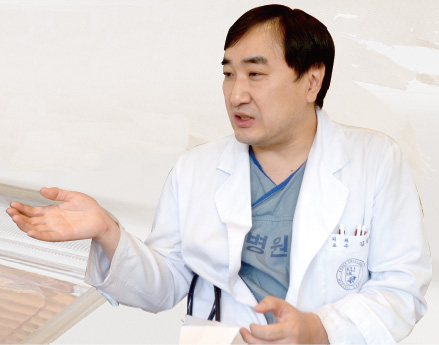
Médecins Sans Frontiéres(MSF) is an international humanitarian medical organization. It was established in 1971 by a French doctor named Bernard Kouchne along with his colleagues and French journalists. They wanted to establish a perfectly independent medical humanitarian organization free from political, financial and religious pressure because humanitarian organizations sometimes receive interference from nations and their fundraisers. Thare are a few MSF staff members in Korea, and CBT reporters met one of them. Kim Nam-ryeol, who jumps into the field where aid support is hard to get, cures the people who are suffering during conflict. Let’s listen to his MSF story! -Ed.

How did you enter MSF?
After I finished my military service as an army surgeon in 2000, I got to know about MSF when they won the Nobel Peace Prize in 1999. At that time, I was a little bit interested in it, so I thought, “Should I try it?” and submitted my application form to the MSF office in Canada. When I applied to MSF for the first time, I didn’t have a mind like, “I am really looking forward to working there.” A few days later, I received an answer from MSF and I was refused because of a lack of experience as a surgeon and my career in the army was unadmitted. Since then, I forgot about MSF until I was running my hospital in 2009. One day, I looked outside through the window and I could see a lot of churches and hospitals. At that moment, I thought, “Even if I don’t run my hospital, people can receive medical services from many other doctors,” and “There are many surgeons who can perform appendix surgery instead of me, but if I go to some regions where it’s hard for people to receive appendix surgery, my value will rise. Is there any organization which will take me to that region?” Finally, I was reminded of MSF again.
Where was your first mission?
I got offered my first mission in Pakistan. At that time, Afghanistan was at war against America, so many Taliban in Afghanistan crossed the border to Pakistan to avoid the attacks from American armies. However, there has been a big problem between Pakistan and Afghanistan. Both of their state religions were Muslim, but the factions were different. Pakistani was Shia and the Taliban were Sunni, so there were a lot of serious conflicts among them.
The Taliban mainly attacked public facilities and police officers in Pakistan, and sometimes there were small wars along the border towns. My mission region was Hangu, which was a small town not far away from the border.
On the first day when I passed the entrance of the hospital, I watched that the entrance’s passage wall was made up of sandbags to protect the hospital from bomb attacks. Police officers at the entrance inspected me to see whether I had bombs or not. After the inspection, I thought, “Ah! Terror attacks are happening around here.” Since I had arrived at Hangu hospital, I had trouble sleeping for 7 days. I could hear the sound of gunfire every night, and at that time I continuously thought, “Why did I come here? And what should I do if terrorists come into the hospital? Where should I go and hide?” 7 days after arriving at the hospital, I got used to living there. Whenever I heard the sound from of gunfire, I thought, “Allah will save me.”
During the mission in Pakistan, I worked with international staff members such as an Italian anesthesiologist, a New Zealander emergency medicine doctor, an Austrian head nurse, and Pakistan local staff members. The most memorable moment I had while staying was drinking with them. Muslim countries prohibit people from drinking, so carrying alcohol in the country was illegal. However, we could drink two bottles of whiskey every month. We usually drank alcohol little by little, but we drank half a bottle when it was somebody’s birthday.
What is the big difference between MSF and the other humanitarian organizations?
MSF’s strong point is the speed of arriving at the disaster site and leaving later from the site compared with the other organizations. There are Rapid Response Teams in MSF and its staff members are fixed, so they are always on standby for dispatching the staff members to the disaster site in 48 hours. Also, relief supplies are in reverse 5 Operation Centers’ airport storehouse, so when a disaster happens, MSF separately sends MSF staff members and aid supplies. Not only the time of arrival at a disaster site is really important but also steady performing for a long time at the site is important. For example, when people receive surgery from doctors, they should be steadily checked by doctors. However, most organizations don’t do it.
When a big earthquake destroyed Haiti, many humanitarian organizations went to help Haiti, but now a few organizations remain to help them and MSF is one of them. Then, when does MSF leave from the mission site? Normally, MSF staff members wait until local doctors come back to their own hospital. When a serious conflict happens, many doctors run from their hospital to survive. Until their return, MSF staff members heal local people in the hospital and keep the hospital in good conditions. After local doctors are back at their own hospital and working properly, MSF mission will finally end. Of course, if MSF staff members’ lives are in danger in a mission area, the mission can end from at that time.
The second strong point is that MSF is perfectly independent from financing. MSF is run by 85% private donations, and it doesn’t reveal donors’ names. Besides, MSF doesn’t receive public funds no matter what the reason is. If MSF received public funds, MSF would take influence from fundraisers. Without being independent financially, independent activity would be really hard.
This is not a strong point of MSF; it is the big difference of MSF compared to others. Most humanitarian organizations compete to get more funds, and the competition is now very serious. They take horrifying pictures in disaster sites and employ celebrities to advertise to get more funds from fundraisers. However, MSF doesn’t do that!
What’s your plan for the future?
I’m going to work in this hospital in 2015. After 2015, I’m going to work as an MSF staff member all my life. Honestly, I don’t know how I will make my living if I just work as an MSF staff member, but that’s just a future problem. If I work hard, I believe a new way will appear in front of me.
To students
I want students to try to be interested in what’s happening around the world. Of course, students don’t have to work like me and there is no law that we must help other countries’ people. However, if some students want to become like me and help people, they need to try to be interested in it. When students get their professional skills or abilities in the future, students need to prepare their mind. Prepared students will have courage to actively perform the mission and are willing to go out to help them. Therefore, I think that it is important not to end your interest in international conflicts but to try to keep your interest till the end.
By Kang Ill-gu
ig33@cbnu.ac.kr


 All
All People
People






 Kang Ill-gu
Kang Ill-gu











